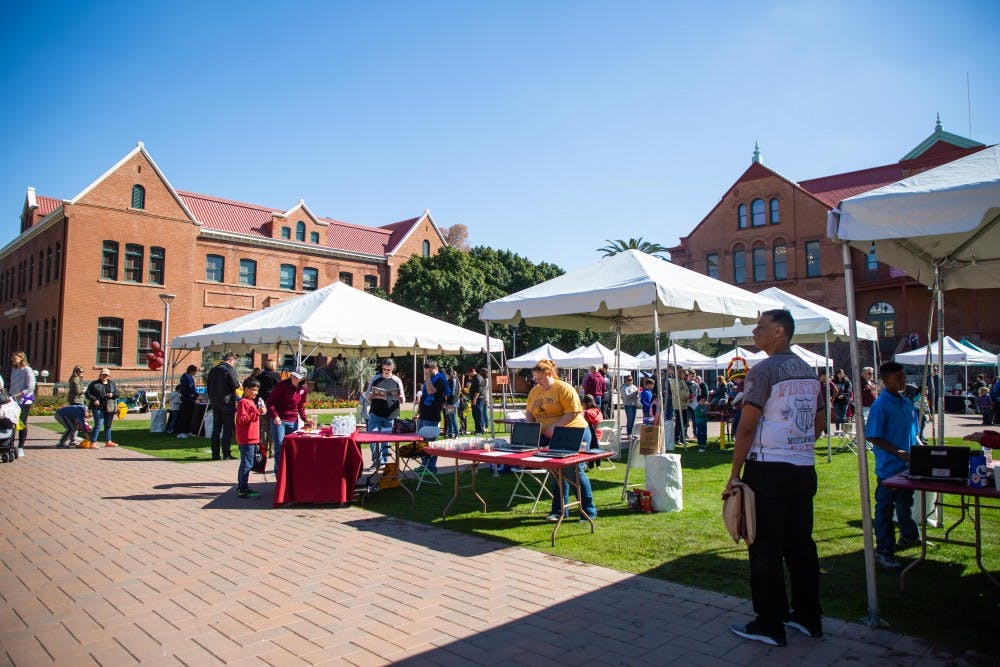Ice caps melting, spikes in greenhouse gas emissions and the extinction of animals due to human-related climate change are all topics that might scare off children from taking an interest in the field of sustainability.
The group has designed several sustainability-themed games that are mostly targeted to children but also relevant to adults. The group uses the games alongside several programs it leads to involve the community in sustainability efforts.
The in-person, interactive games range from a Jenga-themed game to teach people about resource allocation to a guessing card game that requires participants to think about how certain objects can be repurposed.
"Many of the sustainability-themed games emphasize how there are trade-offs when it comes to sustainability and the use of resources," said Jason Franz, a manager of strategic marketing and communications at the Walton Sustainability Initiative.
Several of the games were featured at ASU Tempe's Open Door event on Feb. 23, during which ASU student volunteers helped lead them and encourage more kids to become involved in conservation efforts.
The program's games and activities extend beyond the Open Door event. The Walton Sustainability Initiative also works with local teachers through the Sustainable Teachers' Academies program and brings their sustainable-themed activities to local museums, such as the Children's Museum of Phoenix and the Arizona Science Center.
The initiative's efforts come at a time when Congressional Democrats are pushing for more progress on addressing climate change, including draft legislation for what is known as the Green New Deal that was unveiled in early February and is being headed by Rep. Alexandria Ocasio Cortez (D-NY) and Sen. Edward J. Markey (D-MA).
The games designed by the Walton Sustainability Initiative all draw upon real-world concerns or debates surrounding environmental conservation.
The "Future Builders" game, which plays like Jenga, asks participants to consider the three pillars of sustainability – society, economy and environment – while building a city. The blocks that make up the tower each have a color that corresponds to one of the three pillars, and the act of taking one out from the tower and putting it on top represents allocating that resource to the city's population.
Franz said the activity has even been used with adults, who are also often surprised by how challenging it can be to allocate scarce and valuable resources in a fair way.
Another game designed by the initiative is "Water Roll," which asks participants to distribute an amount of water to agriculture, homes and factories in proportion to their needs.
Participants get a given amount of blue marbles, which represents water and must pour them into three bins based on how much they think each entity requires. They then compare their guess to the correct proportions, which are revealed to them after the game.
Franz said Participants typically underestimate the amount of water that is needed in factories, which utilize large quantities to keep machinery clean.
One of the students leading the games was Sophia Martinez, a senior studying conservation biology. Martinez said she found her interest in sustainability through "studying biology and learning about the importance of conservation."
Martinez volunteered to lead a game to create a sustainable neighborhood using building blocks that represent buildings, roadways, gardens and houses. In the activity, participants attempted to design the city in a sustainable way, deciding where to place green spaces and community gardens.
The game is geared toward younger children and is similar to other building block games.
"They almost don't realize that they are also learning about sustainability," Martinez said.
Gillian Lauter, who is a sophomore studying sustainability and also an ambassador in the School of Sustainability student ambassadors program, was one of the volunteers who led a Walton Sustainability Initiative game at ASU Tempe's Open Door event.
Lauter said games like the ones that the Walton Sustainability Initiative designs are important because they can more directly engage children in important sustainability topics and foster a lifetime interest for the field, such as her own interest in sustainability that stemmed from "connection to nature I've had ever since I was young."
She said she also believes sustainability is a great career path that more students should follow, because "there will only continue to be a need for sustainable solutions."
Reach the reporter at fjali@asu.edu or follow @FarizahAli1 on Twitter.
Like The State Press on Facebook and follow @statepress on Twitter.
Continue supporting student journalism and
donate to The State Press today.




